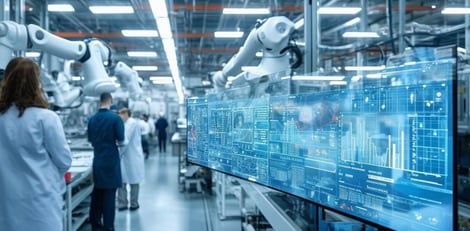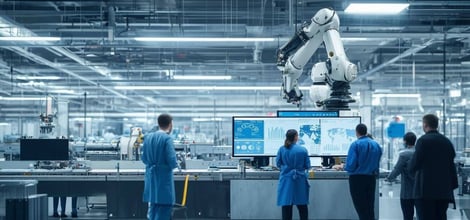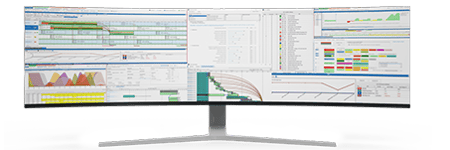Topics: Demand Forecasting, Inventory Optimization, Regulatory Compliance, PlanetTogether Software, AI-Powered Predictive Maintenance, Integrating PlanetTogether, Dynamic Scheduling, Medical Manufacturing

The medical manufacturing industry is under increasing pressure to deliver high-quality products quickly and efficiently. With the growing demand for personalized medical devices, regulatory compliance requirements, and the need to manage global supply chains, traditional production planning methods are no longer sufficient. Enter artificial intelligence (AI)—a transformative force enabling real-time production planning optimization that can help manufacturing IT managers revolutionize their operations.

Manufacturing IT managers in medical facilities face unique challenges, including:
Regulatory Compliance: Ensuring strict adherence to FDA, ISO, and other international standards.
Complex Production Processes: Managing intricate workflows with multiple dependencies and constraints.
Inventory Management: Balancing the need for minimal stock with the risk of material shortages.
Customization: Adapting production to accommodate personalized medical devices and implants.
Global Supply Chain Disruptions: Handling uncertainties in material availability and lead times.
These challenges demand a sophisticated approach to production planning—one that combines agility, accuracy, and efficiency. AI-powered solutions are now proving to be the game-changer.

AI brings a data-driven approach to production planning, leveraging machine learning (ML) algorithms, predictive analytics, and real-time data integration. The benefits include:
Dynamic Scheduling: AI can adjust production schedules in real time based on changing conditions, such as equipment breakdowns, material shortages, or urgent customer orders.
Predictive Maintenance: By analyzing historical data, AI can predict equipment failures and suggest maintenance schedules to minimize downtime.
Demand Forecasting: Machine learning models can analyze market trends, customer behavior, and historical sales data to accurately predict demand.
Optimization Algorithms: AI optimizes resource allocation, ensuring that labor, machinery, and materials are used most effectively.
Scenario Simulation: AI enables the simulation of “what-if” scenarios to assess the impact of decisions before implementation.

The true power of AI for production planning lies in its integration with advanced planning and scheduling (APS) tools like PlanetTogether and enterprise resource planning (ERP) systems such as SAP, Oracle, Microsoft Dynamics 365, Kinaxis, and Aveva. This integration creates a unified platform where data flows seamlessly, enabling smarter decision-making.
Centralized Data: Integration ensures that production planners have access to a single source of truth, reducing errors and inconsistencies.
Enhanced Visibility: Real-time data from shop floors, warehouses, and supply chains provide a holistic view of operations.
Automated Workflows: Automation reduces manual intervention, saving time and minimizing errors.
Scalability: The combined power of AI, PlanetTogether, and ERP systems allows manufacturing IT managers to scale operations without compromising efficiency.
Regulatory Compliance: Integration ensures accurate documentation and traceability, critical for audits and regulatory approvals.
For manufacturing IT managers ready to embark on the AI journey, here are the key steps:
Assess Current Systems: Evaluate existing production planning tools and identify integration opportunities with PlanetTogether and ERP systems.
Define Goals: Clearly outline objectives, such as reducing lead times, improving on-time delivery, or minimizing waste.
Invest in Data Infrastructure: Ensure that the facility has the necessary IoT sensors, data collection tools, and cloud storage for real-time data access.
Select the Right AI Solution: Choose AI tools that align with the facility’s specific needs, ensuring compatibility with existing systems.
Pilot the Solution: Begin with a small-scale implementation to test the system’s efficacy and make adjustments.
Train the Workforce: Equip production planners and IT teams with the skills needed to operate and maintain the new system.
Scale Up: Once the pilot is successful, gradually roll out the solution across the facility.
For manufacturing IT managers in medical facilities, leveraging AI for real-time production planning optimization is no longer optional—it’s essential. The combination of AI, PlanetTogether, and ERP systems like SAP, Oracle, Microsoft Dynamics 365, Kinaxis, and Aveva can unlock unprecedented efficiency, agility, and compliance. By embracing these technologies, medical manufacturers can stay ahead of the curve, delivering high-quality products while meeting the demands of a rapidly evolving industry.
Are you ready to take your manufacturing operations to the next level? Contact us today to learn more about how PlanetTogether and integrated scheduling solutions can help you achieve your sustainability goals and drive success in the medical industry.
Topics: Demand Forecasting, Inventory Optimization, Regulatory Compliance, PlanetTogether Software, AI-Powered Predictive Maintenance, Integrating PlanetTogether, Dynamic Scheduling, Medical Manufacturing
0 Comments







LEAVE A COMMENT